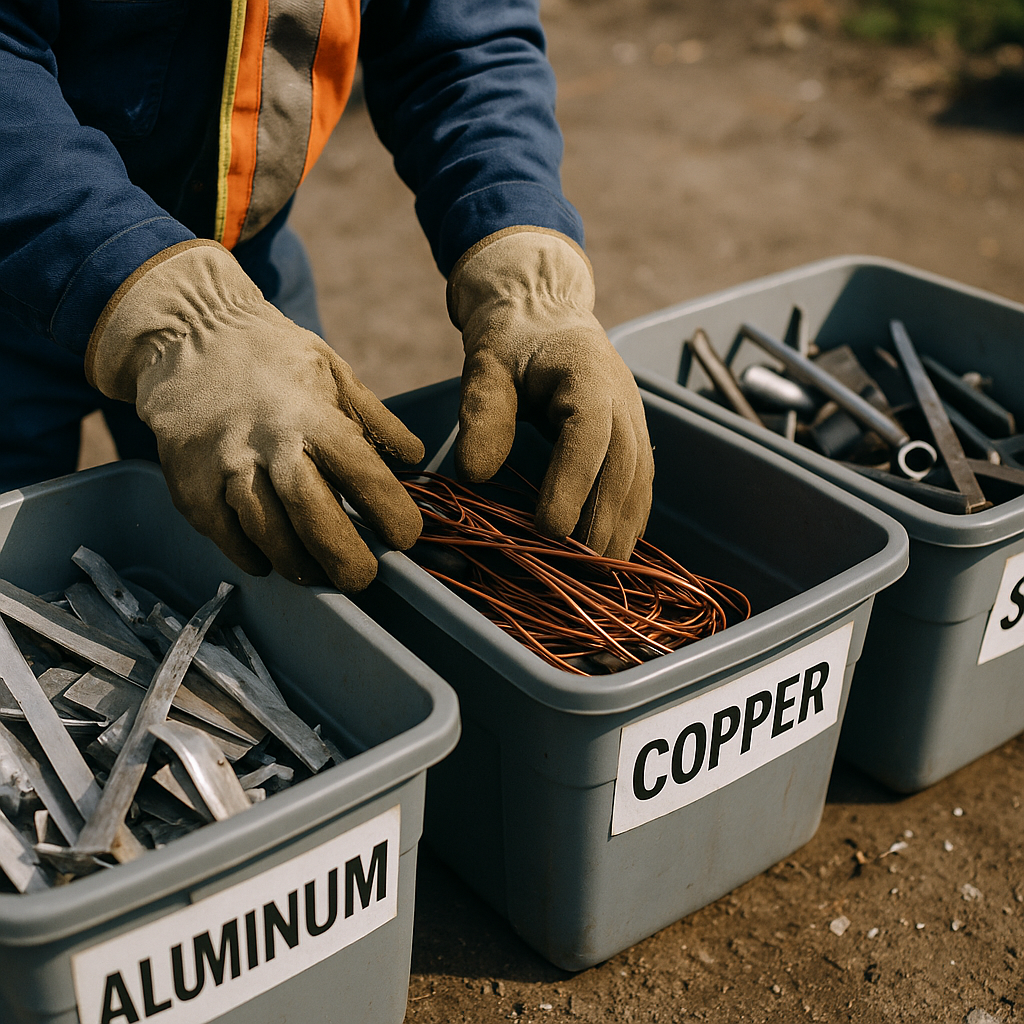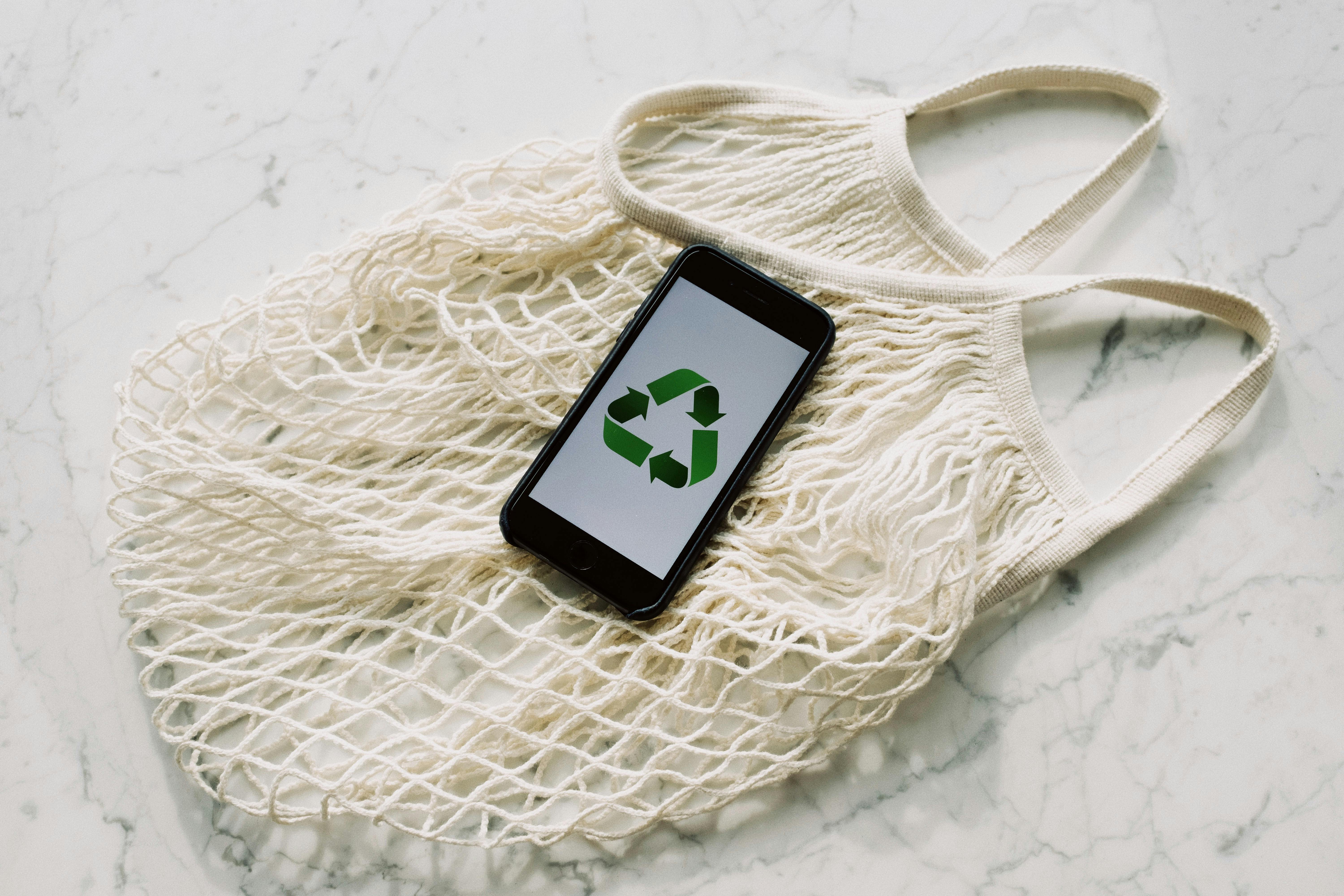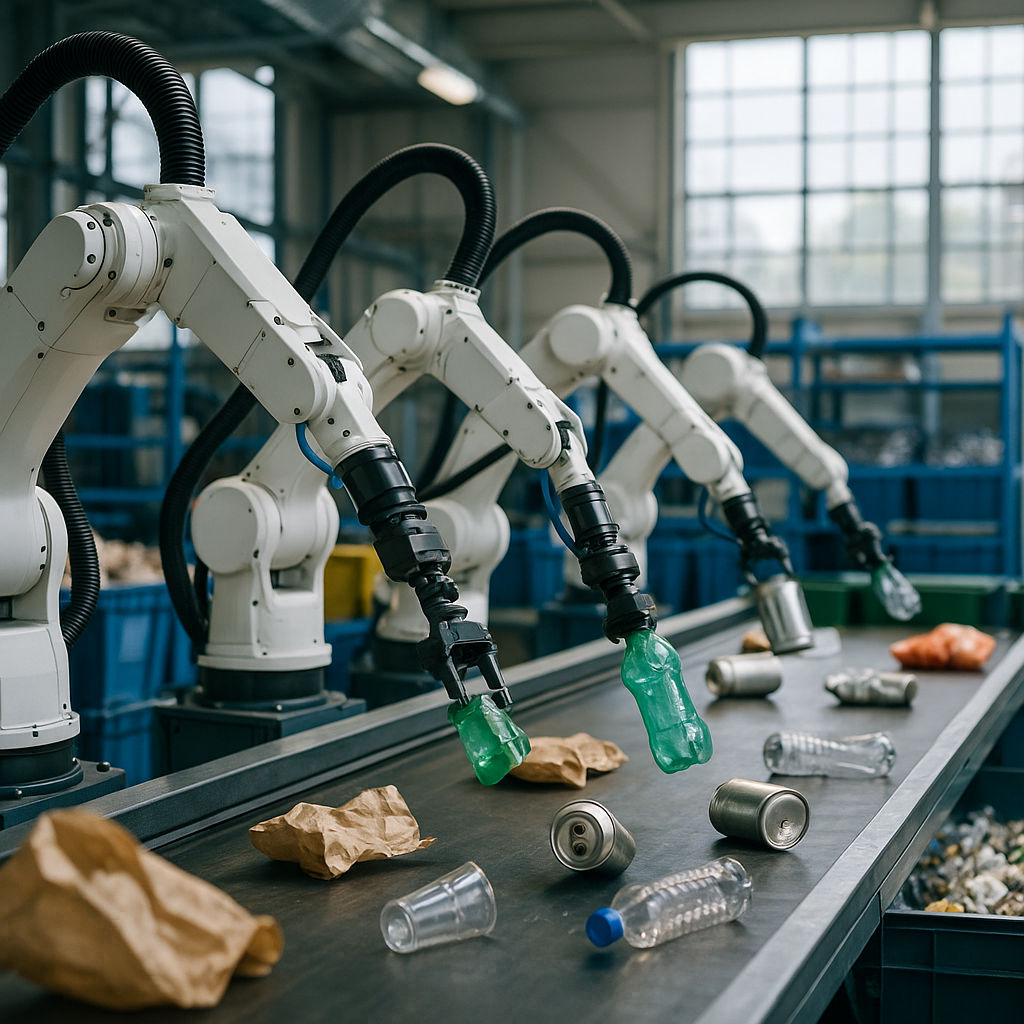5901 Botham Jean Blvd, Dallas, TX 75215
The Importance of Choosing the Right Commercial Recycling Partner
August 5, 2025In the current business environment, selecting the right commercial recycling partner is a strategic decision that directly affects your environmental impact, regulatory compliance, and financial performance. The partnership you establish determines how effectively your waste transitions from a liability to a resource.
Businesses face increasing pressure to prove their commitment to sustainability while maintaining operational efficiency. Your recycling partner is the vital link between your waste management goals and their practical execution. A misaligned partnership can lead to compliance issues, inefficient operations, and missed opportunities for cost savings.
Finding a recycling partner who understands your industry’s specific needs, offers clear reporting, and aligns with your corporate sustainability values involves asking targeted questions during the selection process. The right partner not only collects your recyclables but also becomes an integral part of your sustainability team, helping you navigate regulations and optimize your waste stream for environmental and economic benefits.
What Materials Do You Recycle and How?

Understanding the types of materials a potential recycling partner can handle is crucial when choosing a waste management service. Different recycling facilities have varying capabilities for processing materials, which directly affects how effectively they can manage your specific waste streams and help your organization meet its sustainability goals.
When evaluating recycling partners, it’s essential to ask detailed questions about their material acceptance policies. Some facilities specialize in specific waste streams, while others offer comprehensive recycling solutions across multiple material types.
Common Recyclable Materials
Most recycling facilities process several categories of materials, though capabilities vary by location. Here’s what you should inquire about:
- Paper and Cardboard – Including office paper, newspapers, magazines, cardboard boxes, and paperboard packaging
- Plastics – Typically sorted by resin types (#1-#7), with some facilities accepting only certain numbers
- Metals – Aluminum cans, steel food containers, scrap metal, and in some cases, aerosol cans
- Glass – Bottles and jars, though acceptance varies significantly by region
- Wood – Pallets, crates, and clean lumber
- Electronics – Computers, printers, phones, and other electronic devices
Beyond these common categories, some specialized recycling facilities may also handle materials like textiles, construction debris, or industrial byproducts. For businesses with unique waste streams, finding a partner with appropriate capabilities is crucial.
Understanding Sorting Processes
How a facility sorts and processes materials directly impacts recycling success rates. Modern recycling operations use a combination of technologies and manual sorting to separate materials into clean, marketable streams.
When evaluating a recycling partner, ask about their sorting methodology. Most recycling facilities follow a structured process:
First, collected recyclables arrive at recovery facilities for an initial quality inspection. Loads with excessive contamination may be rejected entirely and sent to landfills, emphasizing the importance of proper sorting at your business.
Next, accepted materials move through a combination of mechanical and manual sorting systems. These can include conveyor belts, screens, magnets for metals, optical sorters for plastics, and air classification systems that separate lighter materials from heavier ones.
After sorting, materials are cleaned, processed into standardized forms (like bales or pellets), and sold to manufacturers who use them as raw materials for new products. The quality of this processing directly determines the value and usability of the recycled materials.
Questions to Ask Potential Recycling Partners
When selecting a recycling service provider, consider asking these specific questions about their material handling capabilities:
- Which specific types and grades of materials do you accept?
- What are your contamination thresholds for different materials?
- How do you handle materials that require special processing?
- What sorting technologies do you employ?
- What happens to materials you cannot process?
- Can you provide data on recycling rates and final destinations of processed materials?
The answers to these questions will help determine if a recycling partner can effectively manage your specific waste streams and align with your sustainability objectives.
Material Recovery Facilities (MRFs)
Many large-scale recycling operations center around Material Recovery Facilities (MRFs). These specialized plants use advanced technology to sort and process recyclables efficiently. Understanding a potential partner’s facility capabilities provides insight into their recycling effectiveness.
State-of-the-art MRFs can process tons of materials hourly using automated systems including optical sorters, ballistic separators, and artificial intelligence to identify and sort different materials. The technological sophistication of a facility often correlates with higher recovery rates and better quality recycled materials.
| Material | Processing Method |
|---|---|
| Paper/Cardboard | Reused to make new paper products, requiring separation and cleaning. |
| Plastics (#1-#7) | Sorted by resin type. Can be mechanically recycled or, for some, chemically recycled. |
| Metals (Aluminum, Steel) | Melted and reformed. Requires sorting from other materials using magnets for steel. |
| Glass | Cleansed and melted to form new products. Requires color sorting. |
| Wood | Reused or converted to mulch; large pieces remilled for construction. |
| Electronics | Disassembled for parts and materials like metals; requires specialized processes. |
For businesses generating various types of waste, understanding a recycling partner’s specific capabilities ensures that your materials can be properly processed instead of being sent to landfills. This knowledge also helps you implement effective internal waste separation practices that align with your recycling partner’s requirements, maximizing recovery rates and minimizing contamination.
What is Your Experience and Reputation in the Industry?
When choosing a recycling partner, consider their experience and reputation as key indicators of reliability and service quality. Companies established in the recycling industry typically have refined processes, understand compliance requirements, and can navigate market fluctuations effectively.
Start by asking straightforward questions about their operational history. Determine how long they’ve been in business and what types of materials they specialize in processing. Experienced recyclers should clearly explain their sorting and processing techniques, demonstrate knowledge of current industry standards, and discuss how they adapt to regulatory changes.
Industry-specific experience is highly valuable. A recycler with experience in your sector will better understand your unique waste stream challenges and compliance needs. They may already have solutions tailored to the specific types of materials your company generates. Ask potential partners about their familiarity with your industry and request examples of how they’ve assisted similar businesses.
Verify Through References and Reviews
Client references provide real-world insights into a recycler’s performance. Request references from customers with similar waste streams, and when contacting them, ask specific questions about reliability, communication, problem resolution, and adherence to pickup schedules. Experienced businesses also maintain detailed documentation of their recycling rates and outcomes, so ask to see data on their diversion rates and processing volumes.
Online reviews and testimonials can reveal service quality patterns. Check business review sites, industry forums, and social media for feedback from current and former clients. Look for comments on responsiveness, pricing transparency, and ability to handle unexpected challenges. Note both positive feedback and the company’s responses to negative reviews, as this reflects their commitment to customer service.
Assess Certification and Compliance History
Reputable recycling companies maintain industry certifications that verify adherence to environmental and safety standards. Ask about certifications like R2 (Responsible Recycling), e-Stewards for electronics recycling, or ISO 14001 for environmental management systems. These certifications indicate a commitment to proper material handling and processing.
The recycler’s compliance history can reveal potential issues. Check for environmental violations or regulatory problems by searching environmental protection agency databases or state regulatory websites. Companies with clean records typically highlight their compliance history as a selling point.
Evaluate Operational Transparency
Transparency in operations indicates trustworthiness. Request a facility tour to observe their processes firsthand. During the visit, note the organization of their facility, safety measures, and how materials are sorted and processed. This provides you with direct insight into their capabilities and commitment to proper recycling practices.
Ask about their downstream partners as well. Responsible recyclers maintain careful records of where materials go after initial processing and can explain how they verify that downstream vendors follow proper protocols. This level of detail shows a thorough approach to material management throughout the recycling chain.
Consider Financial Stability
A recycler’s financial stability impacts their long-term reliability. Market fluctuations in recycled materials can significantly affect operations, as demonstrated when China implemented its National Sword policy restricting waste imports. Companies with solid financial footing can weather these market changes without compromising service quality.
When evaluating potential partners, inquire about their business continuity plans and how they’ve adapted to past market challenges. This information helps you determine whether they’ll remain a dependable partner through economic and industry changes.
Remember that the most experienced recyclers offer more than just waste removal—they provide solutions that help your business achieve sustainability goals while maintaining compliance. By thoroughly vetting potential recycling partners through references, certifications, and direct observation, you can establish a relationship with a reliable service provider who will support your environmental initiatives for years to come.
| Standard Development Organization | Standard or Certification | ISEAL Code of Good Practices | Geography | Material Covered | Activity Covered |
|---|---|---|---|---|---|
| GreenBlue | Recycled Material Standard (RMS) | Yes | North America | Any material | Full chain of custody standard |
| UL Environment | Environmental Claim Validation Procedure for Recycled Content | Yes | Global | Any material | Applies to raw materials, manufactured products, and components |
| SCS Global Services | Recycled Content Standard V7.0 | Yes | Global | Any material | Product manufacturer and its supply chain |
| International Sustainability and Carbon Certification | ISCC PLUS | Yes | Global | All types of agricultural and forestry raw materials, waste and residues, non-bio renewables, and recycled carbon materials and fuels | Full chain of custody standard |
| Association of Plastics Recyclers | APR PCR Certification Endorsement Program | No | North America, APR members only | Plastic | Only recyclers of post-consumer recycled plastics |
How Do You Track and Report on Sustainability Metrics?

Sustainability metrics are crucial for gauging environmental impact and showing progress toward corporate sustainability goals. When assessing recycling partners, it’s important to understand how they track and report these metrics. Comprehensive data collection and reporting capabilities can greatly enhance your organization’s ability to monitor environmental performance and meet strict ESG reporting standards.
The best recycling providers implement structured data collection systems with clear ownership for each metric type. They assign specific personnel to gather information on waste volumes, processing methods, emissions, and the final disposition of materials. This systematic approach ensures data accuracy and consistency over time.
Key Sustainability Metrics to Request
Effective recycling partners should provide various data points that align with standard ESG reporting frameworks, typically including:
Landfill Diversion Rates: This key metric shows the percentage of waste diverted from landfills through recycling, composting, or other recovery methods. A detailed breakdown by waste stream helps you understand which materials are being successfully diverted and which need improvement. Comprehensive reports track your diversion rate trends over time, highlighting progress toward zero-waste goals.
For instance, a manufacturing facility might see an increase in its overall diversion rate from 65% to 78% year-over-year, with notable improvements in plastic packaging recovery.
Carbon Footprint Analysis: Advanced recycling partners quantify the greenhouse gas emissions avoided through your recycling program. This data typically includes metrics on reduced methane emissions from diverted organic waste and carbon dioxide savings from recycled materials replacing virgin resources. These figures help calculate Scope 3 emissions for your ESG reporting.
Resource Conservation Metrics: Look for reports that quantify natural resources conserved through recycling activities, such as water savings, energy conservation, or raw material preservation. For example, a paper recycling program might report on forest resources preserved and water pollution prevented.
Data Collection and Reporting Methods
Inquire about potential recycling partners’ data collection infrastructure. Top-tier providers use digital tracking systems that monitor waste from collection through processing. These systems often include:
– Weight-based measurement at various points in the recycling process
– Material composition analysis to verify recycling rates
– Chain-of-custody documentation for compliance purposes
– Integration capabilities with your sustainability management software
The reporting format is equally important. Seek partners that provide customizable dashboards and reports aligned with major ESG frameworks like GRI, SASB, or TCFD. This alignment simplifies incorporating their data into your broader sustainability reporting.
Verification and Assurance
With increasing scrutiny on ESG reporting, third-party verification is becoming standard practice. Ask recycling companies if their sustainability data undergoes external review or certification. Verified data provides stakeholders with confidence in your environmental claims and helps prevent greenwashing allegations.
Companies subject to regulations like the EU’s Corporate Sustainability Reporting Directive (CSRD) or California’s climate disclosure laws need particularly robust data verification processes. Your recycling partner should understand these requirements and provide appropriate documentation.
Strategic Use of Sustainability Data
Beyond compliance, sustainability metrics from your recycling program can drive meaningful business improvements. Advanced recycling partners help you:
– Identify opportunities for waste reduction at the source
– Track progress toward corporate sustainability goals
– Benchmark performance against industry standards
– Quantify the financial benefits of resource efficiency
– Communicate success stories to stakeholders
For example, a food manufacturer working with a comprehensive recycling partner might discover through detailed reporting that specific packaging components consistently contaminate otherwise recyclable materials. This insight allows them to redesign those components, improving both recycling rates and operational efficiency.
When evaluating recycling providers, request sample reports and inquire about customization options. The most valuable partners provide both standardized metrics for benchmarking and tailored analyses addressing your specific sustainability challenges.
| Landfill Diversion Rates | The percentage of waste diverted from landfills through recycling, composting, or other recovery methods. |
| Carbon Footprint Analysis | Metrics on reduced methane emissions from diverted organic waste and carbon dioxide savings from recycled materials that replace virgin resources. |
| Resource Conservation Metrics | Quantifies natural resources conserved through recycling activities, including water savings, energy conservation, or raw material preservation. |
Finally, consider how frequently data is reported. While annual sustainability reports are common, more frequent updates allow timely interventions when metrics indicate problems. Leading recycling companies now offer quarterly or even monthly reporting dashboards that enable real-time sustainability management.
What Technology and Innovation Do You Use in Your Recycling Process?

Modern recycling facilities employ sophisticated technologies, transforming waste management into precise, data-driven operations. These innovations enable recycling partners to process materials efficiently while providing businesses with valuable data about their waste streams.
Robotic Sorting Systems
Advanced recycling facilities now utilize AI-driven robotic arms for material sorting. These robots identify and separate various recyclables with remarkable accuracy, working continuously without fatigue, thus significantly increasing processing capacity.
The latest sorting robots employ computer vision and machine learning to distinguish between materials that look similar but require different processing methods. This technology reduces contamination and improves the quality of recovered materials, directly impacting recycling economics.
Some facilities have implemented systems where multiple robotic arms work in sequence, each designed to target specific materials, creating a more thorough sorting process than older mechanical systems allowed.
Real-Time Tracking Technologies
Modern recycling partners offer real-time tracking systems that monitor waste from collection to processing. These systems typically use RFID (Radio-Frequency Identification) tags on waste containers to communicate with sensors on collection trucks.
The data acquisition systems on these trucks connect to monitoring stations via GSM/GPRS networks, allowing facility managers and clients to access collection data through secure portals.
Real-time tracking provides businesses with documentation of when materials were collected and processed, supporting sustainability reporting and compliance requirements.
Data-Driven Processing and Analytics
Leading recycling facilities have embraced comprehensive data analytics, monitoring every aspect of the recycling process to identify inefficiencies and opportunities for improvement.
These systems generate detailed reports on material composition, contamination rates, and recovery percentages, helping businesses improve internal waste sorting practices and track progress toward sustainability goals.
Advanced facilities use predictive analytics to optimize collection routes and processing schedules, reducing fuel consumption and ensuring optimal facility operation throughout the day.
Specialized Material Recovery Technologies
Innovative recycling partners have developed specialized processes for challenging materials. For example, lithium-ion battery recycling now employs sophisticated shredding, electrolyte recovery, and metal separation techniques.
These specialized processes recover valuable materials that were previously lost to landfills, representing significant technological advances in addressing complex waste streams.
Some facilities have implemented closed-loop systems where recovered materials remain within a controlled process until ready for remanufacturing, maximizing material recovery and quality.
Transparency and Reporting Systems
Modern recycling facilities provide clients with secure access to processing data and performance metrics. These reporting systems deliver the documentation businesses need for environmental compliance and sustainability initiatives.
The most advanced partners offer customizable dashboards that display key metrics in real time, allowing sustainability managers to monitor progress and identify areas for improvement.
Ask potential recycling partners about their data security protocols and how they protect the information they collect. Responsible partners implement robust systems to safeguard operational data.
Conclusion: Making an Informed Decision for Sustainable Recycling
Selecting the right commercial recycling partner is a crucial decision that affects both your business operations and environmental impact. This guide has explored key questions regarding material handling capabilities, industry experience, sustainability reporting, and technological innovation. Each of these factors is essential to building a successful recycling program that aligns with your sustainability objectives.
When evaluating potential recycling partners, prioritize those who demonstrate transparency in their processes, offer comprehensive reporting, and have the necessary certifications for managing your specific waste streams. A partner with strong local connections for donations and specialized recycling can maximize your diversion rates while minimizing environmental impact. The right partnership adds value by providing cost-effective waste management solutions and helping your business meet sustainability targets and compliance requirements.
For businesses seeking reliable and sustainable recycling solutions, contact Okon Recycling at 214-717-4083 for your recycling needs.
